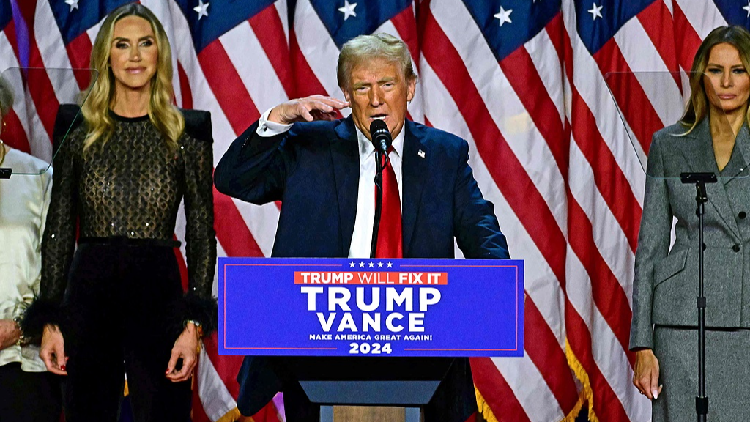"'MAGA of Trump 2.0': A Clear Challenge to Globalization"
Donald Trump's bid for re-election in 2024 indicates a shift toward a more assertive MAGA agenda, emphasizing the revival of American manufacturing, implementing stringent protectionist trade measures, and a recommitment to fossil fuel usage. The author warns that these strategies could jeopardize global supply chains, heighten trade conflicts, and hinder climate change initiatives, potentially resulting in a slowdown of global economic growth.

Donald Trump's significant win in the 2024 US presidential election is set to usher in a more aggressive agenda to "Make America Great Again," as outlined in the 2024 Republican Party's election manifesto and reaffirmed by Trump throughout his campaign.
Trump's economic and trade agenda is composed of three main elements:
First: A counter-globalization strategy aimed at relocating manufacturing and supply chains back to America while revitalizing the American automotive industry. He intends to utilize the extensive executive authority of the presidency to enforce mandates for "Buy American, Hire Americans," prohibiting all American companies involved in outsourcing from receiving federal contracts. The overarching goal is to transform America into "a manufacturing superpower."
Second: A counter-multilateralism trade policy characterized by extreme protectionism and unilateralism. In his narrative focused on safeguarding American workers and farmers, he advocates for “trade rebalance” and seeks to reduce the $1 trillion trade deficit. To achieve this, Trump Administration 2.0 plans to implement a baseline tariff of 10 to 20 percent on all global imports and eliminate China's permanent normal trade relations status, which could lead to cumulative tariffs of around 60 percent on Chinese imports.
Third: A counter-world green transition policy that promotes a return to oil and gas dominance. He intends to withdraw from the Paris Accord once more and remove restrictions on American oil and gas production, positioning the U.S. as the global leader in both sectors. Additionally, he will reverse Biden's policies on electric vehicles and halt imports of Chinese cars.
The first policy, centered on the repatriation of manufacturing to America, risks significant disruption of the existing global supply chain and reflects an unrealistic push for decoupling from the global marketplace. The international division of labor relies on economic laws and market dynamics rather than government mandates. From 2017 to 2024, both the Trump and Biden administrations have vocally supported bringing manufacturing back to the U.S. However, recent data from the Federal Reserve indicates that the American manufacturing production index stood at 99.1 in September 2024, showing no growth over the last eight years.
Trump's approach challenges economic and market forces. Following this rationale, Boeing would be required to consolidate its aircraft manufacturing, currently dispersed across 66 countries, solely within the U.S. Likewise, leading chip design and manufacturing firms would need to relocate to America. Electric vehicles should likewise be manufactured domestically rather than in Mexico. Ultimately, while a significant return of manufacturing is improbable, high tariffs, executive mandates, and penalties could inflict considerable damage on and distort the existing global supply chain.
The principal mechanism for revitalizing American manufacturing and achieving "trade rebalance" is unilateral high tariffs. Trump has stated that the word he cherishes most in the dictionary is tariff. The proposed tariffs of 10 to 20 percent on imports from around the world, along with a 60 percent tariff on Chinese imports, are unlikely to reduce the U.S. trade deficit, but rather are expected to disrupt global trade. This approach directly contravenes the principles of the multilateral trading system spearheaded by the World Trade Organization, particularly the unconditional "most favored nation" status granted to all WTO members. America's unilateral tariffs are jeopardizing the foundation of the post-war free trade system, potentially reverting global trade to pre-GATT conditions.
Historically, unilateral tariffs imposed by the U.S. have not succeeded in diminishing trade deficits, as seen over the last eight years. When the U.S. enacts tariffs on imports, exporting countries respond with reciprocal tariffs on U.S. goods, maintaining mutual tariff levels and ultimately harming the economies and households of both nations.
A Bloomberg report predicted that revoking China's permanent normal trade relations would lead to a 40 percent decrease in U.S. imports, with an overall drop of 55 percent if all American trading partners retaliated. U.S. exports could decline by 30 to 60 percent.
This scenario harks back to the tragic circumstances of the Great Depression in the 1930s, when the U.S. drastically raised tariffs through the Smoot-Hawley Tariff Act. This provoked retaliatory measures from the UK, France, and Canada, resulting in a 61 percent plunge in U.S. exports and a 66 percent drop in imports, thereby extending the Great Depression.
The impending "Trump shock" to globalization and the multilateral trading system is set to occur in an already fragile global environment, which is grappling with geopolitical tensions and economic fragmentation, as trade growth remains below historical averages. Trade restrictions have more than tripled in the past three years. An International Monetary Fund discussion note has warned that, in the worst-case scenario, global fragmentation could reduce world GDP by 7 percent. A World Economic Forum report presents a bleak outlook, suggesting that the global economy may be on the brink of reversing the steady increase in integration that defined the latter half of the 20th century.
The third policy aimed at reviving traditional fossil fuels will significantly undermine global efforts to combat climate change and pursue a green transition. It could also hinder the growth of electric vehicles, solar, and wind energy, ultimately stalling the new engines for sustainable economic growth globally.
If fully implemented, these three policies are poised to further impede the already sluggish growth of the world economy and trade, increasing the likelihood of disruption in the global supply chain and posing a severe threat to the survival and reform of the WTO.
Now more than ever, it is crucial for countries, international organizations, and the global business community to collaborate in supporting globalization and upholding a multilateral trading system grounded in WTO rules. Simultaneously, they must engage in dialogue with the incoming Trump administration and strive to maintain stable economic and trade relations with Washington, as well as with the American business community and citizens at large.
Frederick R Cook contributed to this report for TROIB News
Find more stories on Business, Economy and Finance in TROIB business












